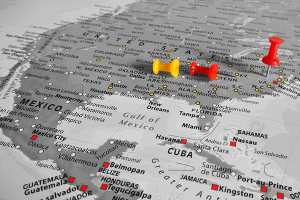/ November 15
Two men with outsized personalities, both intent on bringing dramatic change to their societies. Two countries, side by side, with a long history of friendly trade and sometimes hostile diplomacy.
As leftist president Andres Manuel Lopez Obrador takes the mantle of the Mexican presidency Dec. 1, political experts, former diplomats and business leaders are bracing for a potential collision with self-styled nationalist President Donald Trump.
The anticipated confrontation between Trump and Lopez Obrador — commonly called by his initials, AMLO — could affect Texas more than any other state given the billions of dollars in Lone Star products that are sold south of the border.
The possible flash points include a changing energy policy, trade protections, increased heroin and methamphetamine trafficking and an abrupt reversal of the Mexican government’s costly campaign to confront the powerful drug cartels. But perhaps the biggest is the bitterness engendered by Trump’s harsh immigration policies and his plan to erect an impenetrable wall along 1,200 miles of U.S.-Mexico border.
“There is a rocky road ahead for the relationship between the U.S. and Mexico and the two presidents,” said Duncan Wood, the director of the Wilson Center’s Mexico Institute, during in a recent visit to Houston.
Lopez Obrador is a skilled politician who was mayor of Mexico City from 2000 to 2005 and national party leader, running twice for the presidency prior to winning. He and Trump are forceful, charismatic leaders with a populist, anti-establishment bent to their politics and are adept at inflaming the passions of their base supporters. And perhaps more to the point when it comes to a personality contest, “Neither of them likes to be contradicted,” said Wood.
Indeed, Trump had reportedly referred to the Mexican president-elect as “Juan Trump,” a recognition of the similarities between him and the populist Mexican politician, according to a story in Americas Quarterly.
Both leaders have taken unexpected steps to demonstrate their resolve. Lopez Obrador has put Mexico’s $218 million presidential jet up for sale, while Trump earlier renegotiated the price tag of two Air Force One replacements and claimed savings of $1.4 billion.
But Lopez Obrador has distanced himself from any semblance to Trump, who, in his opinion, “fuels racism … as a political strategy” and a leader who has done Mexico much damage, according to an interview with the Spanish language TV network Univision.
Vice President Mike Pence will lead the U.S. delegation to Mexico to attend Lopez Obrador’s inauguration.
New course for Mexico?
Observers say the Mexican leader has already given some key indications of the course he will steer.
Lopez Obrador’s plan to cancel the construction of the Mexico City airport, a $13.3 billion project with a third of the work already completed, sent shock waves through the investment and business sectors. With U.S. foreign direct investments in Mexico of $110 billion last year, concerns rose about Mexico as a reliable business partner.
“We are already getting a sense of what an AMLO presidency might look like, since the administration has named many of the key policy personnel and moved forward on some campaign promises, such as its consultation for whether or not to keep building the new Mexico City airport,” said Antonio “Tony” Garza, the former U.S. ambassador to Mexico.
Lopez Obrador was able to easily wrest power from outgoing President Enrique Peña Nieto, whose Institutional Revolutionary Party (PRI) had supported global open markets and free trade. But Peña Nieto’s presidency was also hamstrung by unchecked corruption and what was perceived by the Mexican populace as a submissive stance when Trump met with the president and insisted that Mexico would pay for the border wall.
“Trump’s nationalism looks outward; it manifests in attacks on international institutions and the leaders and people from other countries,” said Tony Payan, the director of the Baker Institute’s Mexico Center.
Lopez Obrador’s nationalism looks inward to restoring Mexico’s working class with subsidized policies, “seeking to restore the state as a central economic agent, and his criticism of globalization and the (North American) free trade agreement has to do with his belief that previous administrations implemented a neoliberal economic model that punished the poor,” Payan said.
Key energy policy changes
The stakes are high for the future of the U.S. economic relationship with Mexico, its third-largest trading partner with combined trade of $616 billion.
Mexico was the second largest export market for U.S. products in 2017, while becoming the largest provider of fruits and vegetables and other agricultural products, according to the Office of the United States Trade Representative. Cross-border trade between Texas and Mexico was $187 billion.
Wood agreed that Lopez Obrador’s appointees so far signal a cabinet that is committed to unraveling the energy reforms signed into law in August 2014 by the previous administration, with AMLO already announcing a plan to suspend auctions for oil production contracts in the Gulf of Mexico. “I am particularly worried about the energy sector and what happens next with it,” Wood said.
So far, 110 oil and gas contracts representing about $200 billion in foreign investment have been granted under Mexico’s reform of its energy sector and the national PEMEX oil monopoly, with U.S. companies winning the second highest number of contracts after private Mexican firms.
The energy reforms were considered to be particularly beneficial to Houston’s economy, given its leadership in offshore oil exploration and production technologies.
At a minimum, the airport pullout signaled that Lopez Obrador plans to deliver on campaign promises.
In a recent speech, he pledged to “rescue the oil and gas industry,” from a decline in production that he blamed to the historic opening of PEMEX to foreign investment. When enacted, Lopez Obrador accused the current president of being a “traitor to the country” for handing over “the country’s natural resources to foreigners.”
“The likelihood of the next (Mexican) administration impacting how business is done in the energy sector is high,” said Garza, who’s now counsel to the law firm of White & Case in Mexico City. “The question is how disruptive will it be and if returns will be seen as justifying the additional risk.”
“So far AMLO’s party has proposed legislation aimed at the new regulatory framework,” said Garza, adding that the president elect has been “all over the board on issues having to do with gas and power, and essentially come out against fracking, all of which, if he’s serious about, have the potential to impact Texas.”
Gov. Greg Abbott, through a press aide, said he welcomes working with Mexico’s new administration to build on economic and cultural bonds.
“Governor Abbott believes that a strong relationship with Mexico, our largest trade partner, is essential to Texas’ economic success,” said Ciara Matthews, deputy communications director. “Through cooperation on infrastructure, energy, trade, and security, Texas and Mexico will continue to strengthen our long-standing relationship and bring even greater prosperity to both sides of the border.”
Differences over immigration
Differences with Mexico regarding Trump’s immigration policies, analysts said, could be another contentious topic.
As caravans of migrants departed Central America to seek asylum at the U.S. border in the weeks before midterm elections, Trump moved quickly to politicize the “caravan” by branding it an “invasion” and claiming that Middle Eastern terrorists and gang members were among their ranks.
Trump ordered the U.S. military to the border, and meanwhile threatened to withhold foreign aid to Mexico and the Central American countries whose citizens are fleeing economic hardship and violence.
Mexico choose not to halt the migrants by force, but instead offered visas and asylum to the Central Americans in an effort to induce many to abandon the long trek to the north. Trump has declared the migrant caravans a national security threat, and ordered border agents not to accept asylum seekers who enter the U.S. away from legal ports of entry.
Lopez Obrador has repeatedly criticized Trump’s “xenophobic” and disrespectful depiction of migrants and insisted they should receive humanitarian treatment.
During his presidential campaign, Lopez Obrador introduced a petition before the Inter American Commission on Human Rights condemning Trump for allegedly persecuting immigrants and implementing hate speeches and policies, such as the border wall, in violation of human rights, as he and a lawyer explained the action.
War on drugs in flux
Earlier this month, Lopez Obrador said his administration will de-emphasize the fight against drug cartels, focusing instead on roots of crime, according to a Bloomberg report.
Main points of the strategy include creating a national guard and stressing regional coordination of security efforts, eradicating corruption, rethinking the prohibition of some drugs and creating job opportunities, Lopez Obrador and cabinet members have said.
/ November 15





